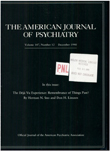Neuropsychiatric, psychoeducational, and family characteristics of 14 juveniles condemned to death in the United States
Abstract
Of the 37 juveniles currently condemned to death in the United States, all of the 14 incarcerated in four states received comprehensive psychiatric, neurological, neuropsychological, and educational evaluations. Nine had major neurological impairment, seven suffered psychotic disorders antedating incarceration, seven evidenced significant organic dysfunction on neuropsychological testing, and only two had full-scale IQ scores above 90. Twelve had been brutally physically abused, and five had been sodomized by relatives. For a variety of reasons the subjects' vulnerabilities were not recognized at the time of trial or sentencing, when they could have been used for purposes of mitigation.
Access content
To read the fulltext, please use one of the options below to sign in or purchase access.- Personal login
- Institutional Login
- Sign in via OpenAthens
- Register for access
-
Please login/register if you wish to pair your device and check access availability.
Not a subscriber?
PsychiatryOnline subscription options offer access to the DSM-5 library, books, journals, CME, and patient resources. This all-in-one virtual library provides psychiatrists and mental health professionals with key resources for diagnosis, treatment, research, and professional development.
Need more help? PsychiatryOnline Customer Service may be reached by emailing [email protected] or by calling 800-368-5777 (in the U.S.) or 703-907-7322 (outside the U.S.).



